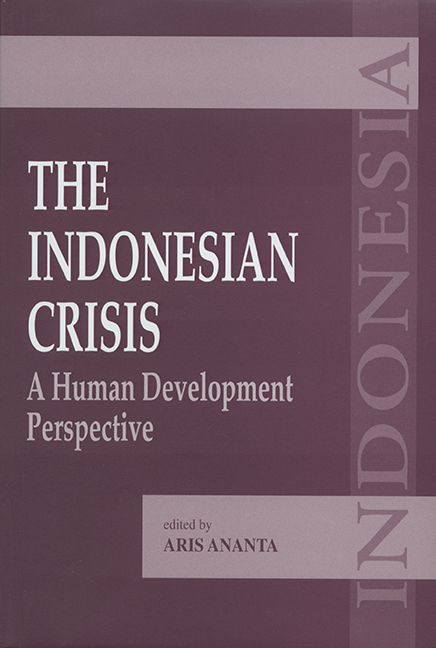Book contents
- Frontmatter
- Contents
- Acknowledgements
- List of Contributors
- Part I Introduction
- Part II Human Capital
- Part III Purchasing Power
- Part IV Emerging Issues
- 13 Political Economy of Business Relations between Indonesia and Singapore
- 14 Drug Abuse in Indonesia: An Increasing Problem During the Economic Crisis
- 15 Managing the Elderly in a Crisis Situation
- 16 The Indonesian Crisis in an Alternative Perspective: Views from Outer Indonesia
- Index
13 - Political Economy of Business Relations between Indonesia and Singapore
from Part IV - Emerging Issues
Published online by Cambridge University Press: 21 October 2015
- Frontmatter
- Contents
- Acknowledgements
- List of Contributors
- Part I Introduction
- Part II Human Capital
- Part III Purchasing Power
- Part IV Emerging Issues
- 13 Political Economy of Business Relations between Indonesia and Singapore
- 14 Drug Abuse in Indonesia: An Increasing Problem During the Economic Crisis
- 15 Managing the Elderly in a Crisis Situation
- 16 The Indonesian Crisis in an Alternative Perspective: Views from Outer Indonesia
- Index
Summary
Introduction
Indonesia and Singapore easily stand at two ends of a continuum in the Association of Southeast Asian Nations (ASEAN), ranging from physical size and per capita national income to, most starkly, their responses to globalization and governance. Both the Indonesian state and government, synonymous with the dominant Golongan Karya (Golkar) since independence in 1945, tightened under Soeharto's New Order in mid-1960s, and the People's Action Party (PAP) in Singapore since 1959 bears resemblance. However, the similarity ends as soon as the strategies and policy options to run the largest ASEAN economy and a mere city-state are put in a practical perspective.
While the historical and traditional symbiosis between Singapore and Malaysia with the British legacy is pervasive, a contention of this chapter is that the political economy of business relations between Indonesia and Singapore has far more potential and opportunities. Paradoxically, national rivalry has emerged between Malaysia and Singapore as a consequence of converging development paths in industrialization and in the level of prosperity and standard of living, especially between Kuala Lumpur and Singapore. The same competitive strain may not, or would take a much longer time to surface for Indonesia as it is a much larger agriculture-based economy and there is more scope for complementarity with Singapore.
Much depends on the evolving political economy of relations and alliances at both the state and private levels, and these prospects are assessed here, beginning with a brief overview of economic relations before and after the financial crisis in 1997. The issues and problems facing Indonesian–Singapore relations are discussed in the following section, first in the context of their respective domestic constraints before translating them into the regional and global environment. The concluding section notes some policy implications, and suggests how business relations can be further synergized between the two countries.
Economic Relations Before and Since the Crisis
Two crucial related areas define economic relations between Indonesia and Singapore: the historical entrepôt trade, and networks of Chinese capital and enterprise. The true magnitude of trade between the two countries has been officially blacked out on the Singapore side since Indonesia's confrontation during Singapore's merger with Malaysia and never restored because of extant smuggling trade. Indonesia must be as important as Malaysia in Singapore's trade relations.
- Type
- Chapter
- Information
- The Indonesian CrisisA Human Development Perspective, pp. 345 - 361Publisher: ISEAS–Yusof Ishak InstitutePrint publication year: 2002

